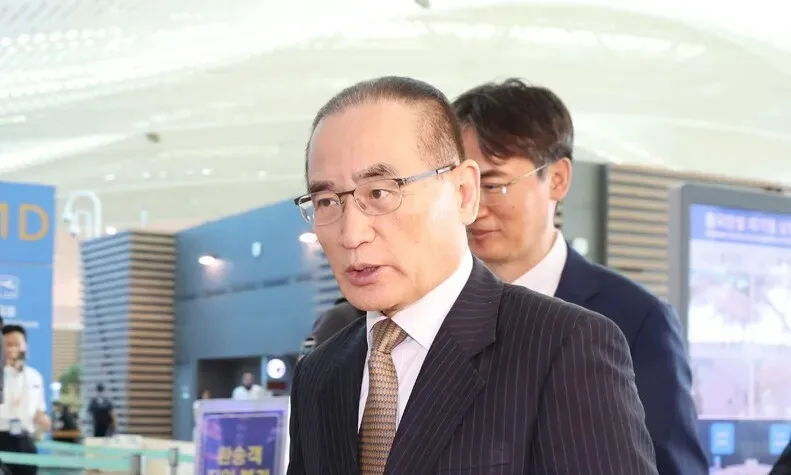hankyoreh
Links to other country sites 다른 나라 사이트 링크
3 missions for South Korea’s national security adviser as he heads to Washington

Wi Sung-lac, the head of South Korea’s National Security Office, jetted off to the US on Sunday. His visit to Washington, DC, is his first since taking office.
Meeting with reporters before departure, Wi explained that negotiations between South Korea and the US “are reaching a pivotal stage.” Indeed, relations between Seoul and Washington are at a crucial crossroads in every area relating to foreign affairs and national security.
As the inaugural principal for foreign affairs and national security under the Lee Jae-myung administration, Wi is tasked with three missions during his US visit: setting an early date for a South Korea-US summit, negotiating reciprocal tariffs, and turning around critical public opinion at home.
While speaking to reporters at Incheon International Airport before his departure on Sunday morning, Wi explained, “A number of issues have been discussed between South Korea and the US in relation to trade and security.”
“I already engaged in similar discussions during my visit to the NATO meeting, and this US visit will be a continuation of those discussions,” he added.
During his visit, Wi appears likely to hold security and trade discussions with US Secretary of State Marco Rubio, who is also the acting US national security adviser.
His first mission will be to nail down a schedule for a US visit by Lee Jae-myung. With the Lee administration having just come into office, organizing an early summit with US President Donald Trump is a matter of paramount importance.
The problem is that there is little time for a bilateral summit with the necessary format and substance, with Trump’s summer vacation scheduled for August and a series of multilateral meetings waiting from September onward, including a UN General Assembly meeting and ASEAN summit.
Given Trump’s preference for handling matters in a “top-down” approach through negotiation with other heads of state, a situation where a summit ends up being put off until after August would increase the burden weighing on the Lee administration.
With the reciprocal tariff pause scheduled to end on Tuesday, tariffs are another key issue that Wi will need to address during his visit.
In the case of tariff matters, the main discussions are likely to be pursued by Minister for Trade Yeo Han-koo, who has been in the US since Saturday. But since Wi is the highest-ranking official Lee could send to the US at present, the possibility of him proposing a larger deal cannot be ruled out.
Also worthy of attention is the fact that Trump was scheduled to send out signed letters on Monday to 12 US trade partners, notifying them of their tariff rates. While it is not yet known whether South Korea was one of the intended recipients, diplomatic world insiders suggested it would not be out of the question for Wi to extend the pause by delaying the letter’s issuance date if South Korea was indeed included, or have a proviso added indicating that the rates in the letter were provisional and only valid until the next negotiations.
A further aim of Wi’s visit is to allay the anxieties that have begun among the South Korean public as the first summit between Lee and Trump has been put off.
Originally, a bilateral summit was supposed to take place at the Group of Seven summit in Canada on June 15-17, but the plan ended up falling through when Trump returned to the US ahead of schedule.
Efforts were also made to coordinate a South Korea visit by Rubio this week. When that visit also fell through, the opposition party and conservative media began voicing concerns about “missed diplomatic opportunities.”
“Wi’s US visit will ultimately be carrying on the same discussions on the same date that the South Korean and US diplomatic leaders were scheduled to have, with only the venue changed,” explained a former senior Ministry of Foreign Affairs official.
“This will go some way in relieving the South Korean public’s anxieties,” they predicted.
By Shin Hyeong-cheol, staff reporter
Please direct questions or comments to [english@hani.co.kr]

Editorial・opinion
![[Editorial] Public has right to know PPP’s relationship with Unification Church [Editorial] Public has right to know PPP’s relationship with Unification Church](https://flexible.img.hani.co.kr/flexible/normal/500/300/imgdb/original/2025/0918/8917581849596456.jpg) [Editorial] Public has right to know PPP’s relationship with Unification Church
[Editorial] Public has right to know PPP’s relationship with Unification Church![[Column] The model students of empire selling out Korea [Column] The model students of empire selling out Korea](https://flexible.img.hani.co.kr/flexible/normal/500/300/imgdb/original/2025/0917/4317580990305751.jpg) [Column] The model students of empire selling out Korea
[Column] The model students of empire selling out Korea- [Editorial] Korea must not allow itself to be rushed into a bad trade deal with US
- [Column] Imperial tyranny, Korean humiliation
- [Correspondent’s column] Cognitive dissonance in MAGA world
- [Editorial] Korea, US need a ‘gentlemen’s agreement’ on what job creation entails
- [Column] Why MAGA has its eyes set on Korea
- [Column] Lee still has his work cut out for him after summit with Trump
- [Editorial] Is this any way for the US to treat an ally?
- [Column] Lee’s difficult task of striking a balance on Japan
Most viewed articles
- 1[Column] Imperial tyranny, Korean humiliation
- 2The woman profiting from spreading anti-China, election fraud conspiracy theories
- 3[Column] The model students of empire selling out Korea
- 4[News analysis] Korea digs in its heels as US pressures it for a blank check
- 5‘What have we done to deserve this?’ Korean workers decry ‘degrading’ treatment in ICE detention
- 6[Editorial] Public has right to know PPP’s relationship with Unification Church
- 7Top diplomats of Korea, China discuss Xi’s visit to Korea and strategic cooperation
- 8Investigators zero in on Yoon’s alleged quid pro quo with Unification Church
- 9Seoul says US must fix its visa system if it wants Korea’s investments
- 10US is not the partner that engaged in good cooperation with allies it once was, Korea’s top diplomat